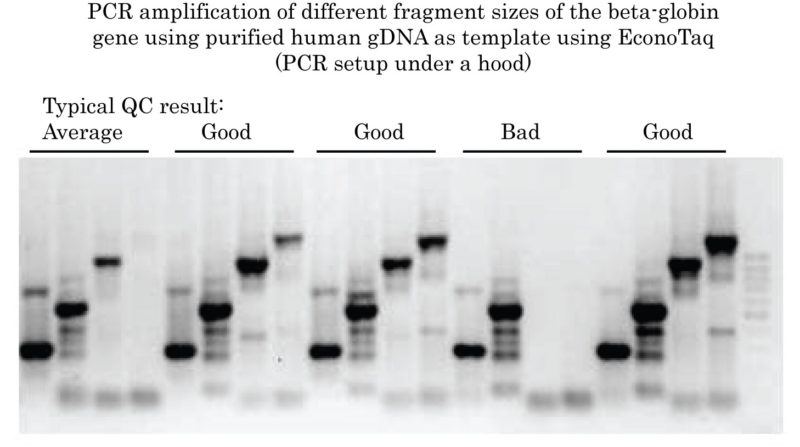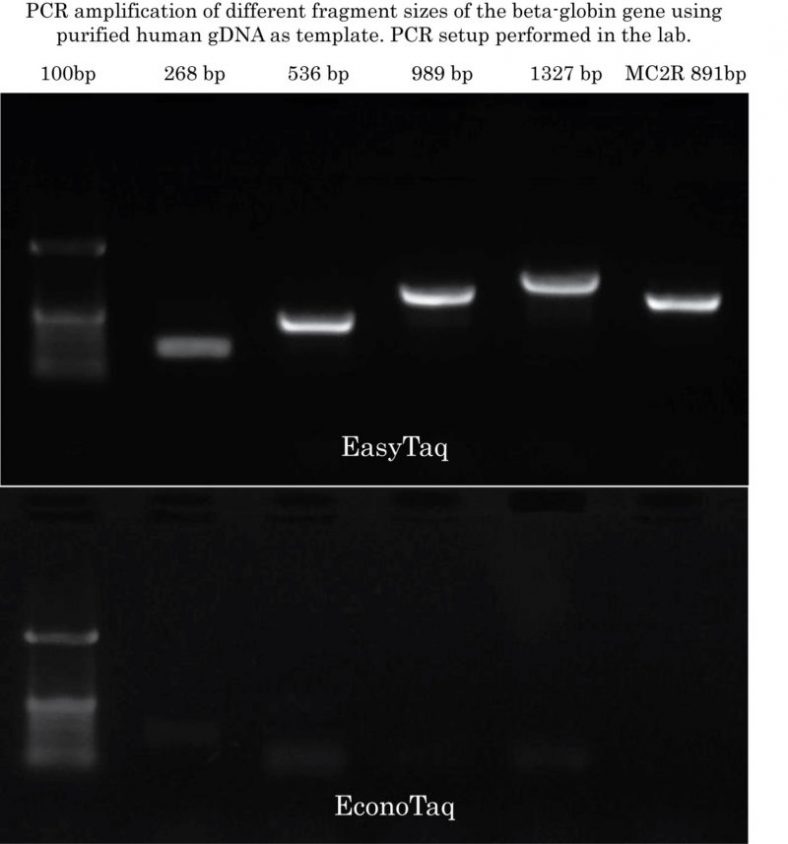Human gDNA Quality Control
PCR Success Story #8Project Description
Human gDNA Quality Control
The lab cannot perform Human gDNA Quality Control : forced setup of PCR reactions under a hood…
This challenge was quite unusual, yet very inconvenient for the researcher’s staff scientists. After solving PCR issues described in PCR Success Story #3, #4, #5 and #6 using Transgen Biotech’s DNA polymerases, we encountered a different type of problem. This well established lab located at the Centre de Recherche du Centre Hospitalier de l’Université de Montréal (CR-CHUM) was convinced something was contaminating the air as the were unable to perform Human gDNA Quality Control by PCR or any type of PCR in their own lab. They had been using Lucigen’s EconoTaq.for over one year. Their lab performs regular gDNA extraction and purification from human blood and perform a quality control assay that consists in PCR amplification of different fragment sizes on the human β-globin gene. Please find bellow what we have accomplished using Transgen Biotech’s EasyTaq DNA polymerase. This project was exciting!?
DNA primers for β-globin:
| B-globin: GH20 | GAAGAGCCAAGGACAGGTAC |
| B-globin: PC04 | CAACTTCATCCACGTTCACC |
| B-globin: RS42 | GCTCACTCAGTGTGGCAAAG |
| B-globin: KM29 | GGTTGGCCAATCTACTCCCAGG |
| B-globin: RS40 | ATTTTCCCACCCTTAGGCTG |
| B-globin: RS80 | TGGTAGCTGGATTGTAGCTG |
Primer pairs for Human gDNA Quality Control :
- GH20 + PC04 = 268 bp
- RS42 + KM29 = 536 bp
- RS40 + RS80 = 989 bp
- KM29 + RS80 = 1327 bp
Project Details
Client: CR-CHUM
Date: May 17th, 2016
Type of experiment: Human gDNA quality control by PCR
DNA Polymerase: EasyTaq DNA Polymerase.
Competitor: Lucigen EconoTaq DNA Polymerase
EasyTaq ''resists'' to air contaminants (if any)!
We went into the researcher’s lab located at the CR-CHUM in Montreal. We brought our own water, dNTPs, EasyTaq and a set of control primers to amplify full-lenght human MC2R from the researcher’s purified gDNA (we had previously validated the customer’s gDNA in our own lab), We set up the PCR reactions in their lab for EconoTaq Human gDNA Quality Control using their tips, tubes and pipettes and left the tubes )mastermix and reaction tubs) opened the entire time during the reaction setup. Primer and DNA dilutions were freshly prepared using our ddH2O. EasyTaq was compared to EconoTaq.
On the next day, the researcher migrated the PCR reactions using their own equipment and in our absence. This is the result of the EconoTaq Human gDNA Quality Control that was obtained.
Which DNA polymerase would you buy?!
Bon, tu peux te péter les bretelles encore une fois!
Ta Easytaq est malade!!! Il me faut tout les détails de ton protocole et ton # de catalogue pour la Taq 🙂
Check ça et devine quelle ligne est ta Taq. exposition ok pour ta TAQ et disparition de Lucigen!!!
Je n’ai jamais eu d’aussi belles bandes qu’avec ta EasyTaq!
EasyTaq PCR reaction setup:
- H2O : 13.4 ul
- 10x buffer : 2 ul
- dNTPs (2.5 mM): 1.6 ul (0.2 mM final)
- Forward primer (10 uM): 0.4 ul (200 nM final)
- Reverse primer (10 uM) : 0.4 ul (200 nM final)
- gDNA 10 ng/ul : 2 ul
- EasyTaq (5 u/ul) : 0.2 ul
EconoTaq PCR reaction setup:
- H2O : 12 ul
- 10x buffer : 2 ul
- dNTPs (2.5 mM): 1.6 ul (0.2 mM final)
- MgSO4 (50 mM) : 1.2 (3 mM final)
- Forward primer (10 uM): 0.4 ul (200 nM final)
- Reverse primer (10 uM) : 0.4 ul (200 nM final)
- gDNA 10 ng/ul : 2 ul
- EconoTaq(5 u/ul) : 0.4 ul
PCR cycling :
- Denaturation: 120s at 94 °C
- 35 x
- Denaturation: 15s at 94 °C
- Annealing: 20s at 55 °C
- Extension: 35s at 72 °C
- Final extension: 120s at 72 °C
Want PCR to be easier for you too?
Put us in charge of optimizing PCR conditions for you. It’s FREE !


